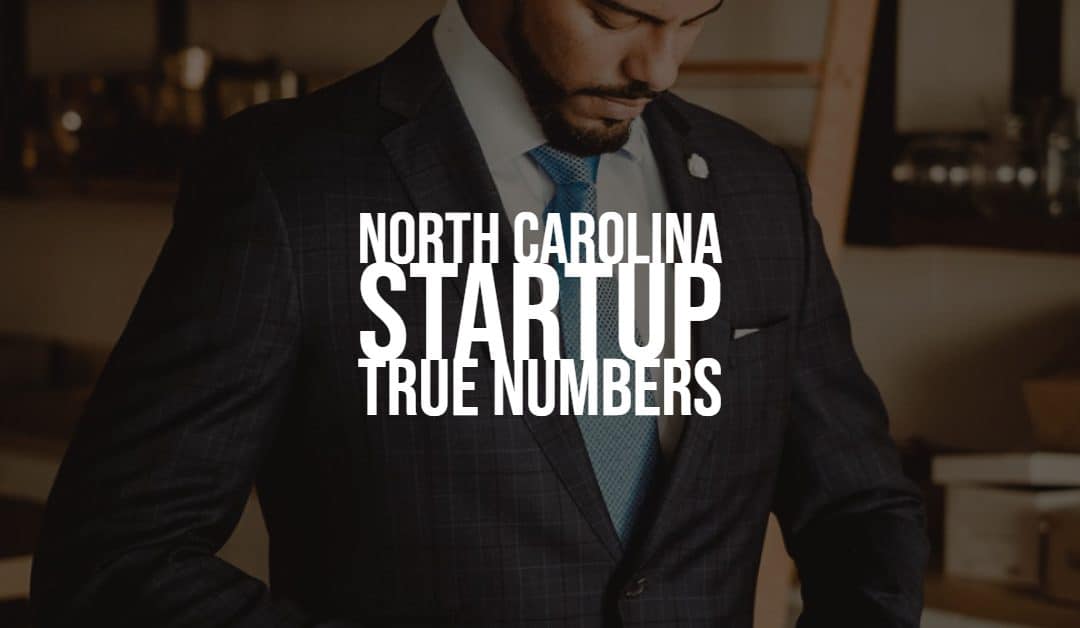How can we better judge the number of real North Carolina startup companies each year?
During my last blog, I highlighted that in 2018 “600,000 new companies were started in the US and 500,000 failed”.
These were EIN issuance numbers quoting Tom Ruhe, CEO of the NC IDEA Foundation, at the Entrepreneurship Ecosystem Summit held in Raleigh on November 18 and 19.
My last blog was titled: WHY THE HIGH FAILURE RATE OF STARTUP BUSINESSES—NC and US. The NC part of that number is approximately 30,000 startups per year and 24,000 failures and figure the Triangle for a third of that activity.
Because these EIN numbers are filled with flaky ideas, whims, hobby businesses, proprietorships, businesses opening new divisions or operations, I think it is a terrible way to judge the real number of Serious Startups each year.
In my opinion, about 75% of those getting an EIN is not what we want to call “Real New Startups—Real Entrepreneurial Startups”.
Real Entrepreneurial Startups should meet the following criteria:
- They have an idea for a new product, service, business, or franchise that has been seriously vetted for a year or two. That means at least 5 competitors in and outside the market area have been studied in detail with a SWAT analysis on each that you can compare to your own SWAT analysis,
- The business will be set up as an LLC or C corporation with appropriate filings, operating agreements, and legal support—and name branding is in place,
- The entrepreneur has written a business plan or a marketing strategy and has mapped out his product and service delivery strategy,
- The business has a clear idea of its “buyer persona, what will cause them to make a buy decision”, and what that Sales Channel Strategy will look like,
- The business “supply chain” has also been mapped out (all businesses have a supply chain running from raw materials to quality control and customer satisfaction),
- The entrepreneur has a passion for the idea and is expected to give the new business at least 40 hours a week to start,
- There is surrounding support: a co-founder, partner, a licensor, advisors/mentors, a business coach, service contractors to cover accounting, legal, HR, insurance, marketing,
- The entrepreneur/founder knows it will take at least $50,000 to get the business started and has that put away or knows exactly where it is going to come from,
- The business will follow some kind of startup instruction plan—something structural that has mandatory steps like the EntreDot SIX STEPS TO SUCCESS Process. There are more than 50 organizations in the Triangle Area alone that have some such structured process or curriculum they ask their members or clients to follow. That does not include the universities and community college’s entrepreneurial curriculum.
- The entrepreneur/founder is not afraid to grow a multi-million- dollar business and will have the right resources in place to make that happen. It may take a few years to get there but the passion and perseverance are imbedded in the Management Team.
This business profile puts you in the Real Entrepreneurial Startup Class and I guess you join about 150,000 Real Entrepreneurial Startups each year across the US and about 15,000 in NC.
My Experience with Startup Company Statistics
My EntreDot experience between 2008 and 2018 was one in four so-called entrepreneurial conversations led to one solid “they have got what it takes” conclusion.
That was over a sampling of 4,000 conversations and we started with the philosophy “that there were no bad ideas”. The EntreDot sample was primarily from the Triangle and Eastern NC and was focused on what we describe as “Main Street Businesses” across as many as 30 SIC codes. Most local investment funds and CDFI’s experience a similar ratio.
This ratio is ok, there should be 4 ideas for every Real Entrepreneurial Startup. It is just that we shouldn’t mislead ourselves that the 4 ideas equal startups.
I don’t think there is anything wrong with NC having 15,000 Real Startups each year when each is going to generate 3-5 full and part-time jobs by their second anniversary and of course, there is nothing wrong—in fact, everything right-about we the collective entrepreneurial ecosystem trying to double that number to 30,000 over the next 3 years. I am assuming about one-third of those NC Real Entrepreneurial Startups will operate from the Triangle.
That will be a lot of entrepreneurial startup energy in the Triangle, with plenty of work for entrepreneurial educators, those 50 Triangle groups with their own tailored classroom, one on one, and on-line entrepreneurial instruction programs, all the functional support service providers, the large number of qualified mentors and business coaches, and all the different lending institutions and sources of equity for these Real Entrepreneurial Startups headquartered here in the Triangle.
It would be great if we actually had a list each year of our 5000 plus Triangle Real Entrepreneurial Startups so we could track their progress, see how their numbers grow, count the jobs they create, and graduate them into their third year of business and beyond. My goal would be 80% make it through their first two years and are well on their way to meeting their Mission, sales, and profit objectives as they head into year three.
Personally, as the founder of Lienhart Leadership Consulting (www.bradlienhart.com) that excites me because I like to work with companies two to five years old who are ready to scale and accelerate their growth. Sometimes that takes a shift in Team Leadership just like it does in coaching expertise. It is great to live and work in the Triangle in the midst of all this Real Entrepreneurial Growth. I don’t know about you but I don’t think Austin, TX has anything that we don’t have right here in the Triangle Entrepreneurial Ecosystem!

